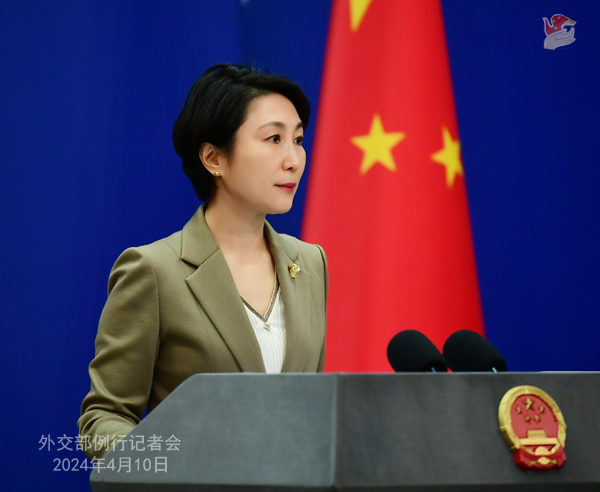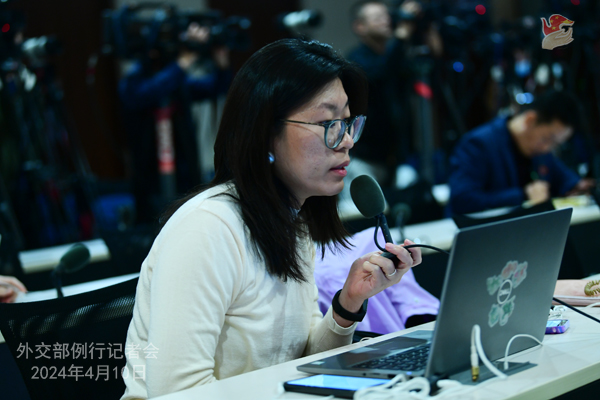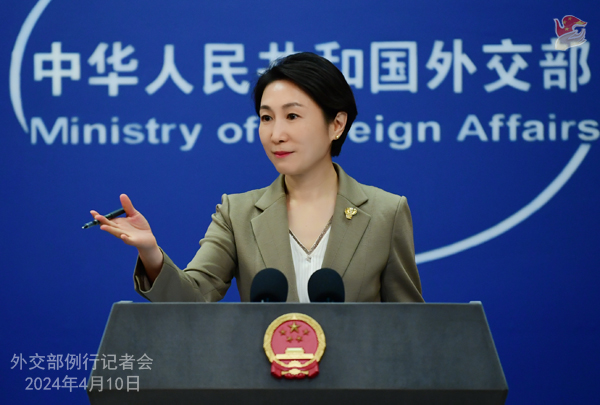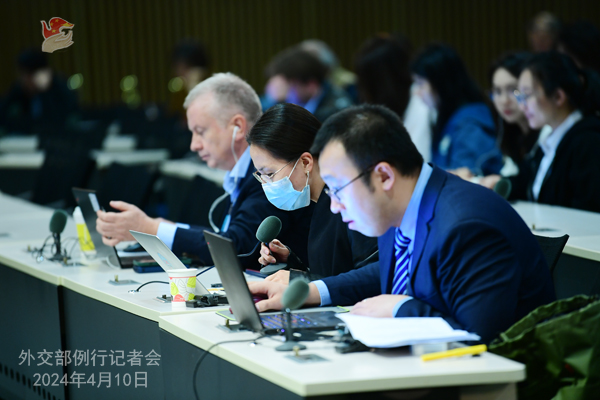| Foreign Ministry Spokesperson Mao Ning’s Regular Press Conference on April 10, 2024 |
| 2024-04-10 19:11:51 |
|
CCTV: Yesterday, President Xi Jinping met with President Wesley W. Simina of the Federated States of Micronesia (FSM). We witnessed visits to China by leaders of Pacific Island countries, including Nauru and FSM, recently. Can you share more on the relations between China and Pacific Island countries? Mao Ning: China and Pacific Island countries boast a long history of cooperation. Our cooperation serves the common interests of the two sides and is welcomed by the governments and people of Pacific Island countries. Last July, President Xi Jinping presented China’s policy toward Pacific Island countries. Specifically, China fully respects the Pacific Island countries’ sovereignty and independence, and their will, cultural traditions and effort to seek strength through unity. Yesterday, during the meeting with President Wesley Simina of FSM, President Xi Jinping further stressed our belief that when countries develop relations with Pacific Island countries, it is essential for these countries to let Pacific Island countries make their own choices, put development first, and stay open and inclusive. The island countries have the right to choose a development path suited to their national conditions and carry out friendly cooperation with all development partners. China will continue working with Pacific Island countries under the principles of mutual respect, equal-footed consultation, win-win cooperation, openness and inclusiveness, to bring more benefits to the people of island countries, promote development and revitalization of island countries, and advance peace, stability, development and prosperity of the region. AFP: US Deputy Secretary of State Kurt Campbell said that the US has told China that if Russia makes more territorial gains in Ukraine, it will have an impact on the China-US relationship. What’s your comment? Mao Ning: On Ukraine, China has always taken an objective and just position and played a constructive role in actively promoting peace talks. China and Russia have the right to carry out normal cooperation. Such cooperation should not come under external interference or constraint. China will not accept the accusations and pressuring. If the US truly cares about peace and wants an early end to the crisis, it should reflect on the root cause of the crisis and do something that will actually help bring about peace, rather than deflect the blame to China. Reuters: Related to Campbell’s comments as well yesterday. The US is considering easing warnings for its citizens traveling to China. This is what Deputy Secretary of State in the US Kurt Campbell said. He said that these warnings may have curtailed exchanges between Americans and the Chinese people. What is the Foreign Ministry’s thoughts on this? Mao Ning: The US State Department travel warning against China is totally unwarranted and has deterred many Americans wanting to come to China. We hope the US will rescind the groundless warning and revise the wrongful advisory level as soon as possible to remove this stumbling block in China-US people-to-people exchanges.
AFP: The EU today announced an inquiry into Chinese wind turbine suppliers in Europe. Several suppliers allegedly have accepted unfair subsidies and other forms of support from the Chinese government. The EU announced earlier investigations into solar PV, electric vehicles and other sectors in China. What’s your response? Mao Ning: Many in the world are deeply unsettled by the EU’s rising protectionist tendency. China is highly concerned over the EU’s discriminatory actions against Chinese companies and even the entire industries. China’s new energy sectors’ development is a result of our strong technology, robust market and full-fledged industrial chains. China’s exports of related products contributed significantly to the global response to inflation and climate change. We hope the EU will not keep stressing the importance of fighting climate change on the one hand and yet damage the global efforts to deal with the issue on the other. Protectionism does not solve one’s own problems. Protectionism only protects backwardness. It costs the future and results in lose-lose. We urge the EU to observe WTO rules and market principles. China will firmly protect the lawful rights and interests of Chinese companies. Hubei Media Group: All peacekeepers of the 27th Chinese peacekeeping contingent to the Democratic Republic of the Congo were awarded the UN Peace Medal yesterday. Can you share more details? Mao Ning: On April 9, the awarding ceremony to honor the 27th Chinese peacekeeping contingent to the Democratic Republic of the Congo (DRC) was held at the “China Peninsula” camp of the Chinese contingent in South Kivu. All 218 Chinese peacekeepers were awarded the UN Peace Medal. Head of the United Nations Organization Stabilization Mission in the DRC and Special Representative of the Secretary-General in the DRC Bintou Keita commended the Chinese peacekeepers and said the Chinese peacekeepers have exemplified dedication and professionalism through their mission and helped defend peace and development in the region. China is an active participant of and important contributor to UN peacekeeping operations. China is the largest troop contributor to peacekeeping operations among the permanent members of the Security Council and the second largest contributor to UN peacekeeping assessments. We have dispatched a total of over 50,000 peacekeepers. Chinese peacekeepers abide by the purposes and principles of the UN Charter, act in strict accordance with their mandates and faithfully fulfill their peacekeeping missions. China will continue to actively participate in UN peacekeeping operations and play a bigger role in safeguarding international peace and security. Reuters: US Deputy Secretary of State Kurt Campbell also made these remarks yesterday. He said that a large number of Chinese “economic migrants” coming to the US in recent months has been “gathering concern”, and that China was aware but did not seem to be taking steps to curtail the flow. Does this phenomenon worry China and are there any actions being considered for this? Mao Ning: I’d refer you to competent Chinese authorities for the specific question. What I can tell you is that China’s position on the issue of illegal migrants is consistent and clear. China opposes and firmly cracks down on all forms of illegal migration.
CRI: The leading global management consulting firm Kearney recently released the 2024 Kearney Foreign Direct Investment Index. China jumps from the 7th position last year to the 3rd this year, and tops the emerging markets rankings. What’s your comment? Mao Ning: We noted the report. In recent years, China has put into effect the Foreign Investment Law, enhanced the foreign-related legal framework and strengthened intellectual property protection. Standards and regulations in various areas are improved, and the investment environment is more stable, transparent and predictable. China has been advancing institutional opening-up to align with high-standard international economic and trade rules. In 2013, there were 190 items on China’s first negative list for foreign investment. Now the number has been slashed to 31 in the national negative list and only 27 on the free trade pilot zones negative list. Sound investment environment and high-standard opening-up have raised foreign businesses’ confidence in investing in China. To invest in China is to invest in the future. China will continue improving the business environment and expanding the space for mutually beneficial cooperation through developing new quality productive forces to share with the wider world China’s market and development dividends. Bloomberg: Fitch Ratings revised China’s outlook to negative from stable, saying that the government is likely to pile on debt as it seeks to pull the economy out of a real estate slowdown. Does the Foreign Ministry have a comment on the Fitch Ratings’ revision on China’s outlook? Mao Ning: China’s Ministry of Finance has issued a response. I want to stress that the long-term positive trend of China’s economic growth has not changed. The Chinese government’s capability and resolve to maintain a good sovereign credit has not changed either. AFP: According to Admiral John Aquilino, Commander of the US Indo-Pacific Command, the US was concerned about China’s dangerous actions near Ren’ai Jiao in the South China Sea, and its actions are destabilizing the region. What’s your comment? Mao Ning: Nansha Qundao has always been part of China’s territory. The law enforcement activities that China has taken at sea are to safeguard territorial sovereignty and maritime rights and interests. They are lawful, justified and beyond reproach. The recent heightened tensions in the South China Sea have a lot to do with US meddling. If the US truly wants peace and stability in the South China Sea, it should stop fueling the tensions, forming gangs and inciting confrontation. Reuters: US National Security Advisor Jake Sullivan said that more joint patrols can be expected in the South China Sea. This is after drills by the US, Australia, the Philippines and Japan last weekend. At the same time today, Philippine President Marcos said that the upcoming trilateral summit between the US, the Philippines and Japan will include an agreement to maintain security and freedom of navigation in the South China Sea. What is China’s response to these developments? Mao Ning: With the concerted efforts of China and ASEAN countries, the South China Sea situation has been generally stable. There is no issue with regard to the freedom of navigation in the South China Sea. Countries outside the region, led by the US, have been cobbling together small groupings in the South China Sea. They have been stoking confrontation in the name of cooperation, flexing muscles in the name of peace, and sowing chaos in the name of order. This is no doubt an act of hegemonism. Let me make it clear, no external interference will deter China from defending our territorial sovereignty and maritime rights and interests. AFP: It’s reported that Chinese leader will visit Europe in early May. Can you confirm it? Mao Ning: I have nothing to offer on that.
|



